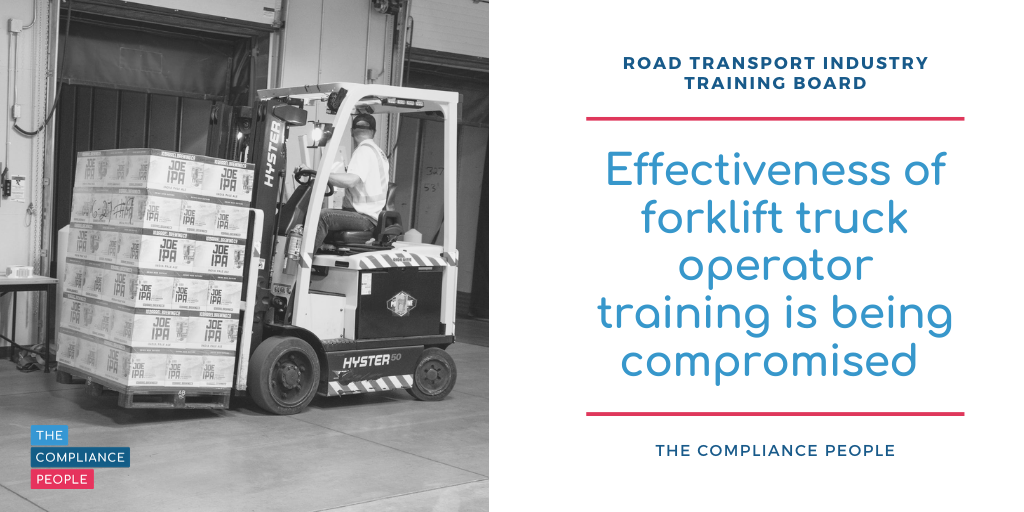Home → Updates → News → Effectiveness of forklift truck operator training is being compromised
Effectiveness of forklift truck operator training is being compromised

The Road Transport Industry Training Board (RTITB) declares the effectiveness of some fork lift truck operator and driver certificate of professional competence (CPC) training is being compromised due to poor company culture, and its negative impacts on employee behaviour.
Organisations that have negative safety cultures often see candidates behaving poorly during training sessions, which can impact the quality of the training, missing important points.
To combat negative behaviour, RTITB, says it is important for instructors to create conditions that can encourage positive behaviour to improve the effectiveness of forklift training.
RTITB recommends workers are given a clear understanding of the processes when operating forklift trucks, and that standards covered in training should transfer to the job, and not just be left at the training environment. Embedding the correct standards would eventually improve employees attitudes and the culture of the company.
A significant proportion of reported accidents involve a rider operated truck (e.g. forklift truck) which are caused by:
- lack of training;
- operator error;
- lack of knowledge of the working environment;
- poor company culture; and
- poor conditions in premises.
Many reported accidents usually involve pedestrians, who are too frequently left suffering serious injuries after being hit by a rider operated lift truck at work.
In England, Scotland, Wales and Northern Ireland The Health and Safety at Work Act 1974 (HASAWA) requires employers to ensure, so far as is reasonably practicable, the health, safety and welfare at work of their employees and anyone else who may be affected by their business activities.
Organisations operating in England, Scotland and Wales, making use of a forklift truck must be aware of their obligations under the HASAWA and in the following regulations:
- The Management of Health and Safety Regulations 1999
- The Provision and Use of Workplace Equipment Regulations 1998
- The Lifting Operations and Lifting Equipment Regulations 1998
- The Workplace (Health and Safety Welfare) Regulations 1992
- The Control of Substances Hazardous to Health Regulations 2002
Equivalent regulations are in operation in Northern Ireland, including:
- Lifting Operations and Lifting Equipment Regulations (Northern Ireland) 1999
- Management of Health and Safety at Work Regulations (Northern Ireland) 2000
- Provision and Use of Work Equipment Regulations (Northern Ireland) 1999
- Workplace (Health, Safety and Welfare) Regulations (Northern Ireland) 1993
- The Control of Substances Hazardous to Health Regulations (Northern Ireland) 2003
Equivalent regulations are in operation in the Republic of Ireland including:
- Safety, Health and Welfare at Work Act 2005
- Safety, Health and Welfare at Work (General Application) Regulations 2007
- Safety, Health and Welfare at Work (Chemical Agents) Regulations 2001
Organisations providing insufficient training or no training are potentially negligent in their duty of care and risk enforcement action from the HSE.
A significant amount of cases investigated by the HSE, find that companies fail to implement safe working practices with the use of forklift trucks. If your organisation uses forklift trucks, it is recommended that you periodically review policies and procedures to ensure these are current.
For further information on Rider-operated lift trucks published from the HSE, please click here
